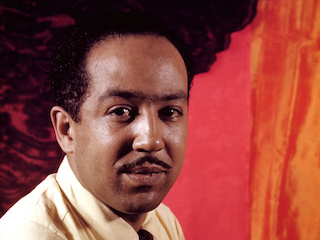
Langston Hughes (1902-67). An American poet, social activist, novelist, playwright, and columnist. He was one of the earliest innovators of jazz poetry and a central figure in the Harlem Renaissance, a cultural and artistic movement that celebrated African American identity and heritage in the 1920s and 1930s.
Early Life and Education
Hughes was born in Joplin, Missouri, and spent much of his childhood living with relatives in Kansas, Illinois, and Ohio. He developed an early interest in literature and began writing poetry during his youth.
He later attended Columbia University but left before completing his degree, choosing instead to travel extensively, including visits to Africa, Europe, and Mexico, experiences that shaped his perspective on racial and social issues.
Literary Career
Hughes published his first book of poetry, “The Weary Blues” (1926), which established him as a significant literary voice. His poetry often depicted the everyday lives of African Americans, combining elements of jazz and blues rhythms with poignant social commentary. Some of his most notable works include:
- “Montage of a Dream Deferred” (1951) – a collection of poems that explore racial injustice and dreams deferred in American society.
- “The Negro Speaks of Rivers” (1921) – one of his most famous poems, celebrating the depth and history of Black heritage.
- “I, Too” (1926) – a powerful poem asserting African American identity and resilience.
In addition to poetry, Hughes wrote novels, short stories, plays, and newspaper columns. His fiction works, such as “Not Without Laughter” (1930), a coming-of-age novel, and the humorous “Simple” stories, further solidified his role as a storyteller of Black life in America.
Social and Political Activism
Hughes was an outspoken advocate for racial equality and social justice. His works often addressed issues of racism, economic disparity, and the struggles of working-class African Americans. Although not directly affiliated with any political movement, his writings carried strong themes of leftist ideology and solidarity with marginalized communities.
Legacy and Influence
Hughes’ contributions to American literature and culture remain profound. His work inspired generations of Black writers and artists, and his influence is evident in contemporary poetry, music, and theater. Today, he is celebrated as a literary icon, and his legacy is honored in institutions such as the Langston Hughes House in Harlem and the Langston Hughes Medal, awarded for outstanding contributions to literature.